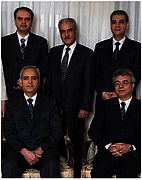Bahai Leaders Must Continue to Wait
» Court Delays Trial
The trial of seven Bahai leaders in Iran that was scheduled to start on Sunday was postponed. This is not the first postponement of the trial. Fariba Kamalabadi, Jamaledin Khanjani, Afif Naimi, Saeed Rezai, Behrouz Tavakoli, Vahid Tizfahm and Mahvash Sabet are member of a group called Yaran who as leaders of the Bahai community in Iran have been behind bars for the last 17 months. The charges against these seven individuals are espionage for Israel, propaganda against the Iranian state and insulting religious tenets. According to judiciary officials, these individuals have already “confessed to be spies for Israel,” something that the international Bahai community and their family members have rejected.
Gholam-Hossein Elham, the spokesperson for Ahmadinejad’s government too has accused these Bahais to be connected to Israel and has said, “This is an organized group linked to foreigners, Zionists in particular.”
The trail of the Bahai leaders was first scheduled to start on August 18, 2009 but was postponed at the request of the defense attorneys. No reason has so far been given for the cancellation of Monday’s trial. There had also been news reports about their trial in February of 2009 and then in July 2009 both of which were postponed for undisclosed reasons.
The suit against the Bahai leaders was first investigated at branch 1 of the prosecutor’s office and then transferred to division 28 of the revolutionary court with its indictment.
Dayan Alai, the representative of the International Bahai Community at the United Nations who had earlier announced the possibility of the postponement of the trail of the leaders of the Iranian Bahai community said, “If the trial is not held, the accused must be released on bail, as Iranian law requires.”
When the Bahai leaders were charged, Abdolfattah Soltani, one of the defense attorneys for the group had said that the indictment against them was a dangerous one. “The case against them is so serious and weighty that the different attorneys were each allowed to read only a part of the indictment. Despite the completion of the discovery and the readiness of the accused to defend themselves and go to trial, the case is not accessible to anyone.”
The European Community has earlier announced through a statement that it was concerned about the unfair trial of the seven Iranian Bahai leaders. The statement had also objected to the fact that the accused had no access to defense attorneys and had not been formally charged while being kept behind bars. Amnesty International had issued a similar statement adding that the Bahai leaders were in danger of execution.
These concerns elevated when some reports indicated that the leaders were charged with being “mohareb” (at war with God), a charge that is punishable by death in the Islamic Republic. According to Bani Dugal the Bahai representative of the International Bahai Community at the UN the family members of the detainees had been told that the Bahai leaders could be charged with being moharb. According to him, a number of Bahais had been executed in the Islamic republic on this charge.
The Islamic Republic of Iran does not recognize Bahaism as a religion and their activities have been banned since 1983.
According to Amnesty International, there are more than 300,000 Bahais in Iran even though the Iranian constitution does not formally recognize them. Bahais are regularly harassed, discriminated against and denied their basic civil rights in Iran.


